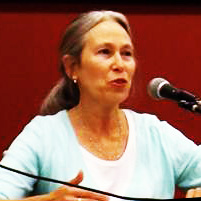International Impact

Wendy Goldman
Sports fans may have their eyes on Brazil as it hosts the 2014 World Cup, but beyond the soccer fields, the country is facing a different form of competition.
Workers are on strike over conditions and wages, women are raising questions about violence and inequality and there is strong interest in the history of socialism.
Many of the issues are eerily similar to those raised in the 1917 Russian Revolution, putting Carnegie Mellon University historian Wendy Goldman's work in the spotlight.
Goldman, professor of history in the Dietrich College of Humanities and Social Sciences, is a historian of the Soviet Union and Russia who studies politics, labor and women. Her 1993 book, "Women, the State and Revolution: Soviet Family Policy and Social Life, 1917-1936," explored the early socialist experiments with women's emancipation, free love and the "withering-away" of the family.
Twenty-one years later, the book's themes still resonate. It was just translated into Portuguese, and Goldman was recently invited to Brazil for a multi-city tour to discuss its implications.
Her lectures in São Paulo, Rio de Janeiro and Campinas drew more than 600 people ranging from faculty and students to factory employees, union members and transportation and sanitation workers. Ordinary citizens and academics alike were looking for lessons from the Russian Revolution to help them as they struggle with feminism, the role of families and class and labor issues.
"Carnegie Mellon tends to view the international impact of our university's research mainly through the lens of business, but it needs to be measured in a lot of ways," Goldman said. "Many of our books have policy implications. The translation of our research and our books into foreign languages is an example of how Carnegie Mellon's humanities have a global impact and a very broad and applicable reach."
She continued, "Books have an almost unlimited life, and their reach is often unpredictable. Book translations give books a whole new audience, and place our work within a new political and social context."
Goldman fielded questions on how the Bolsheviks tried to solve women's problems, such as marriage, divorce and childcare responsibilities, and what worked and what did not.
Brazil's decision to host the World Cup is adding to the unrest. Transport workers in São Paulo brought the city to a standstill before the games started. Secondary school teachers were on strike, and outsourced university workers formed unions to demand decent wages and working conditions. Everywhere, working people accuse the government of corruption over expensive yet unfinished infrastructures. Rather than improve the slum housing of the favelas that line the road from the international airport to Rio, the government has invested in panels to hide conditions from tourists and foreign soccer fans.
The situation is escalating so much that Goldman had trouble getting to her São Paulo lecture because the city's transportation workers had gone on a wildcat strike, abandoning their buses and routes and causing a massive, city-wide gridlock.
"There is enormous interest in Brazil at this moment in socialism and radical solutions to problems created by globalization and capitalism," she said. "It is enormously exciting to me that at this moment of workers' empowerment and feminist organizing, the book has found a new audience interested in the history it explores."
Related Links: History Department | Dietrich College | Wendy Goldman | Goldman's Book
